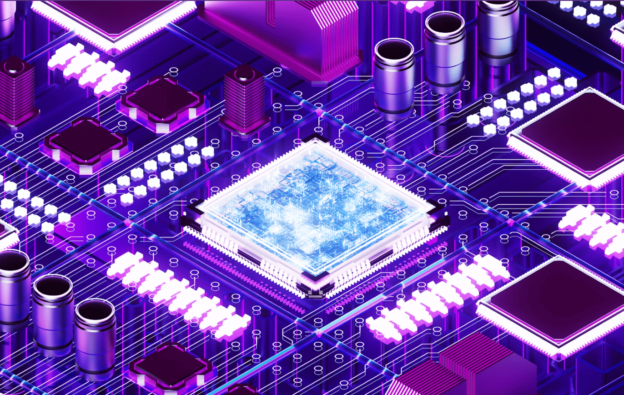Insider Brief
- The Quantinuum team reports in a blog post that matching strength-to-strength-to-strength of quantum computing, supercomputing and generative artificial intelligence could lead to new discoveries.
- The company explains that its Generative Quantum Eigensolver (GQE) uses quantum-generated data to train an AI that proposes better quantum circuits in a feedback loop.
- The approach could scale to complex molecules and be applied to materials science, drug discovery, and other problems classical computers struggle to solve.
A new hybrid method combining artificial intelligence (AI) with quantum computing could reshape how scientists solve fundamental chemistry problems, according to a blog post from Quantinuum. The company teases that more news about this quantum AI method and its use in chemistry may soon be on the way.
At the center of the effort is a system the company calls the Generative Quantum Eigensolver (GQE), which the company discussed in a pre-print study last year. GQE links quantum hardware with an AI model to help calculate the ground state energy of molecules. This quantity — the lowest possible energy a molecule can occupy — is critical in chemistry and materials science, but notoriously difficult to compute using classical methods. Quantinuum’s approach shows that quantum computers, with the help of generative AI, may finally be able to tackle problems once considered intractable.
Method Validated
The method was validated using the hydrogen molecule, a benchmark system with a known solution. In that test, Quantinuum’s hybrid setup reached chemical accuracy, a standard threshold for real-world applications, the team writes. While the hydrogen molecule is a simple test case, researchers say the method could scale to more complex systems, potentially accelerating drug discovery and materials design.
The work marks what the company describes as the first successful use of a quantum processor paired with a transformer-based AI to solve this type of problem. Transformers are a class of machine learning models best known for powering natural language models like GPT, but here they are repurposed to navigate quantum circuits in search of promising solutions.
Unlike classical computers, which rely on deterministic logic to process data, quantum computers operate on qubits — quantum bits that can represent multiple probabilistic states. This allows them to explore a vast space of possibilities. However, quantum hardware is still limited in scale and prone to noise, meaning researchers must carefully choose which circuits to run.
That’s where the AI model plays a critical role, the company states. In Quantinuum’s system, trial circuits are run on a quantum processing unit (QPU). Each run produces a quantum state, and the energy of that state is measured. These results are then used to train a transformer model, which begins to identify patterns and propose better circuits for the next round. The system improves iteratively, gradually honing in on the lowest energy state possible.
GenQAI
This learning loop — a feedback cycle between quantum measurements and AI-generated circuit proposals — is what Quantinuum calls “Generative Quantum AI,” or GenQAI.
In many ways, GenQAI relies on the combined strengths of three powerful systems — AI, quantum computing and supercomputers. In this best of all worlds scenario, artificial intelligence can help mitigate the limitations of quantum hardware while enhancing its problem-solving capacity, according to the post. The quantum computer produces data that would be difficult or impossible to generate with classical systems. The AI model learns from this data to guide the quantum computer’s next moves, creating a self-improving system.
The broader goal is to expand this approach beyond small molecules like hydrogen, the team writes. Quantinuum scientists say they are already working to apply the method to larger molecular systems that classical computing struggles to handle. This includes problems in materials discovery, molecular design and even large-scale optimization, domains where understanding low-energy states is essential.
Pharmaceutical, Chemical Research Use Cases
In fields like pharmaceuticals, the ability to accurately model chemical interactions could reduce the time and cost required to identify promising drug candidates. In energy research, it could help develop more efficient catalysts or novel battery materials. Because ground state energy affects how molecules behave and interact, accurate calculations at this level are often a bottleneck in scientific innovation.
Traditional methods for calculating these values require extensive computing resources and still face limitations when modeling quantum phenomena. Classical brute-force techniques don’t scale well, since the number of quantum states in a system grows double-exponentially with size. This means even modestly complex molecules become practically unsolvable with standard tools.
Quantinuum’s results suggest that combining a quantum system’s ability to generate rich, hard-to-classically-simulate data with AI’s pattern recognition and optimization capabilities may offer a path forward.
The company is positioning its work as a new framework for hybrid computing, where quantum and classical tools are no longer siloed but work in tandem. Their GQE approach highlights a shift toward practical applications of near-term quantum hardware, even as fully error-corrected quantum machines remain years away.
According to the team, next steps will focus on scaling the method, refining its efficiency, and targeting real-world cases where classical simulations fall short. The broader concept of Generative Quantum AI, they argue, could be adapted for challenges in logistics, environmental modeling, and beyond.
“This is just the beginning,” the company writes. “We’re already looking at applying GQE to more complex molecules—ones that can’t currently be solved with existing methods, and we’re exploring how this methodology could be extended to real-world use cases. This opens many new doors in chemistry, and we are excited to see what comes next.”
Quantinuum Explains How AI-Guided Quantum System Could Solve Molecular Problems






